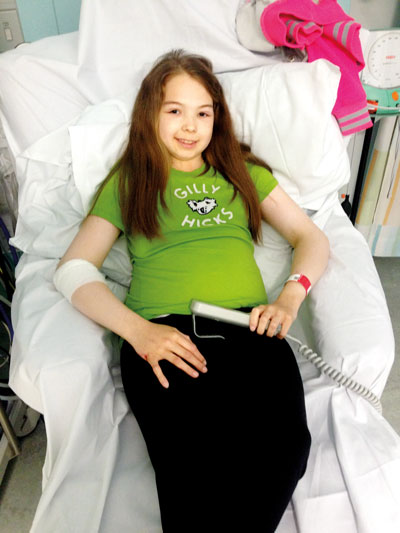27 Oct 2017 - {{hitsCtrl.values.hits}}
 Ever heard of the term Nephrotic Syndrome? Even if you haven’t, you might be familiar with a disease where small children lose protein with their urine. This condition requires them to be hospitalized and be on long term drugs. If you notice such symptoms it’s likely that you have Nephrotic Syndrome. The reason that this condition demands attention is because it makes the child more susceptible to certain infections. In addition, in rare cases, it has the potential to cause chronic kidney failure in small children.
Ever heard of the term Nephrotic Syndrome? Even if you haven’t, you might be familiar with a disease where small children lose protein with their urine. This condition requires them to be hospitalized and be on long term drugs. If you notice such symptoms it’s likely that you have Nephrotic Syndrome. The reason that this condition demands attention is because it makes the child more susceptible to certain infections. In addition, in rare cases, it has the potential to cause chronic kidney failure in small children.
Health Capsule this week decided to consult Dr.Deepal Perera, Consultant Paediatrician at the Lady Ridgeway Hospital for Children, to obtain a professional’s advice regarding this potentially debilitating condition for the benefit of our reader.
Definition 
Nephrotic Syndrome isn’t a disease in itself, but a collection of symptoms. These symptoms occur due to changes in the kidney tissues. The microscopic structures within the kidney, termed nephrons, are the units that filter blood. Blood is pumped in small vessels through the unit called the glomerulus, which has very small pores that allow fluid and waste to escape outside the vessel. This unit at the same time helps keep the blood cells and other proteins inside. According to Dr. Perera, in Nephrotic syndrome, our body’s immune system damages the glomerulus, allowing protein to escape.
Symptoms
Most of the children presenting with this condition are between 2-5 years; boys presenting commoner than girls. “The most frequent complaint is the swelling of the face, specially around the eyes. Some others may present with whole body swelling,” said the doctor.
Some may also present with reduced urine output and blood in urine. This condition may also resemble a urine infection where there is pain during urination. Fever might be one of the symptoms in this condition.
“Even though patients usually present with these conditions, there are four salient features associated with Nephrotic syndrome. These symptoms help us differentiate the condition from other disease conditions,” continued Dr. Perera. The four features are:
1.Reduced protein in the blood (Hypoproteinemia)
2.Generalized body swelling
3.High Cholesterol levels in blood
4.Passing of protein in blood (Proteinuria)
“A similar condition to Nephrotic Syndrome is Acute Glomerular Nephritis, in which the salient features are blood in urine, Hypertension and reduced urine output”, explained Dr. Perera. He further explained that coming to a definitive diagnosis is important in treating the patient. The child may also be referred to a kidney specialist if the doctor deems it necessary.
Complications
One might wonder why Nephrotic Syndrome is so worrisome if these features are the only ones present in a child. But proteins in blood do a great deal of work, function-wise. Proteins have the ability to retain water within the blood vessels through attraction. forces When there is a lack of protein, the fluid portion in the blood leaks out from the vessels into the surrounding spaces like the pleura of the lungs and abdominal cavity. These are ideal grounds for bacteria to grow in. In addition, some of the proteins that are lost have an immune function in the body which is to protect it from external micro organisms. During this condition this function fails to take place. Therefore these children are more susceptible to infections when compared with other children. Also, due to the leaking of fluid to the outside, the volume of blood reduces, which may cause the patient to go into shock, if he is not kept hydrated. In addition, there is an increased possibility in these patients to develop blood clots, due to the increasing of the thickness of the blood. This will result in conditions like Deep Vein Thrombosis.
Other complications that they might experience are High Blood Pressure, Kidney failure, which may resolve after treatment. In some cases these conditions may lead to Chronic Kidney Failure, and rare heart conditions due to increased Cholesterol.
Treatment
After the diagnosis, the patient’s blood pressure and urine protein would be monitored daily. Patients are treated long term with the drug Prednisolone; a steroid, according to the doctor. “If the child doesn’t respond to steroids, we may have to prescribe alternative treatments”, explained the doctor. A special diet comprising of low cholesterol and low salt food is also recommended. Even though protein is lost through urine, high a protein diet isn’t advisable.
Nephotic Syndrome, as explained earlier, isn’t a disease, but an underlying cause like Lupus or an infection and may be the causative factor. So, finding out if there is an underlying disease and treating it is an important step in the treatment process.
Relapses
“One of the biggest worries in Nephrotic Syndrome is it’s tendency to relapse”, said Dr. Perera. Therefore, even after being discharged from hospital, the child has to be on long-term steroid therapy. The parents are taught to check the child’s urine for traces of protein at home, so that a relapse can be recognized early.
Follow-up
For children who have had Nephrotic Syndrome, it’s extremely important to follow the drug regimen as per the doctor’s advice. It is also a must to bring the child for regular follow-ups, even if he shows no signs of a relapse. This is because even though steroid therapy is essential as the cure, the child needs to be monitored for the possible development of adverse effects of the drug itself, which may include growth retardation and adrenal suppression.
Even though modern medicine has advanced in leaps and bounds much is yet to be discovered on the how’s and why’s of Nephrotic Syndrome. But, early detection and treatment will aid in preventing and minimizing the complications associated with the condition. Therefore the doctor cautions parents to seek immediate medical care if their children display symptoms of Nephrotic Syndrome which include; facial and body edema, frothy urine and reduced urine output.
23 Dec 2024 2 hours ago
23 Dec 2024 3 hours ago
23 Dec 2024 4 hours ago
23 Dec 2024 4 hours ago
23 Dec 2024 6 hours ago